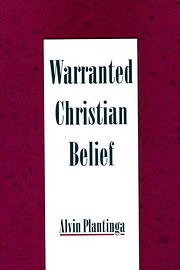

Klik op een omslag om naar Google Boeken te gaan.
|
Bezig met laden... Warranted Christian Belief (editie 2000)door Alvin Plantinga (Auteur)
Informatie over het werkWarranted Christian Belief door Alvin Plantinga
 One Book, Many Authors (246) Bezig met laden...
Meld je aan bij LibraryThing om erachter te komen of je dit boek goed zult vinden. Op dit moment geen Discussie gesprekken over dit boek. geen besprekingen | voeg een bespreking toe
Describes the notion of warrant as that which distinguishes knowledge from true belief. This volume examines warrant's role in theistic belief, tackling the questions of whether it is rational, reasonable, justifiable, and warranted to accept Christian belief and whether there is something epistemically unacceptable in doing so. Geen bibliotheekbeschrijvingen gevonden. |
Actuele discussiesGeenPopulaire omslagen
 Google Books — Bezig met laden... Google Books — Bezig met laden...GenresDewey Decimale Classificatie (DDC)230.01Religions Christian doctrinal theology Christianity, Christian theology Doctrinal Dogmatics - TheologyLC-classificatieWaarderingGemiddelde: (4.25) (4.25)
Ben jij dit?Word een LibraryThing Auteur. |
||||||||||||||||||||||||||||||||||||||||||||||||||||||||||||||||||||||||||||||||||||||||||||||||||||||||||||||||||||||||||||||||||||||
Plantinga hunts for defeaters to the stance that Christian belief does not imply lack of intellectual warrant. No matter one's position on the topic, this is a masterwork of scholarship worthy of careful reading and consideration. Yes, it will take quite some time and effort to work through, but it is the worth the journey.
(